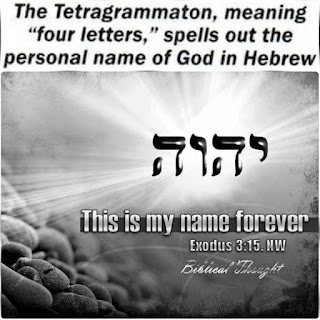THE LIVES OF THE PATRIARCHS #24 | THE LIFE OF MOSES #6
Pastor Christopher Choo
Lesson 3706
THE LIVES OF THE PATRIARCHS #24
THE LIFE OF MOSES #6
GOD'S MOST HOLY NAME: YHVH #1
The name “YHVH” is extremely sacred to Jews - so sacred that most orthodox Jews will not pronounce it.
In Hebrew, the sacred Name is called Shem HaMeforash, “the ineffable Name.”
When reading the Torah “The Law” and they come across “YHVH”, they substitute the name “Adonai” (my Lord) in its place.
When they are not reading the Torah, they simply refer to Him as HaShem (The Name).
The KJV renders YHVH as “LORD” with all caps.
“Jehovah” is actually used in four passages where the name is particularly stressed (Ex 6:3; Psalm 83:18; Isaiah 12:2; 26:4). See also Gen 22:14; Ex 17:15; Judges 6:24.
In Scripture where the name “Adonai” occurs, it is written as “Lord” e.g. in
Psalm 110:1 - The Lord [YHVH] said to my Lord [Adonai, Messiah], “Sit at My right hand, till I make Your enemies Your footstool.”
YHVH is the special memorial-name that God revealed to Moses at the Burning Bush. "And God said to Moses, "I AM WHO I AM; and He said, Thus you shall say to the sons of Israel, I AM has sent me to you... this is My eternal name, and this is how I am to be recalled for all generations" (Exodus 3:14-15).
Even though the name YHVH appears in Genesis 2, God didn't reveal Himself as YHVH until Exodus 3 in conjunction with the creation of Israel.
This name comes from the Hebrew verb which means "to be."
YHVH emphasizes God's absolute being. He is the source of all being, all reality, and all existence. He has to be inherent in Himself. Everything else derives it's being from Him.
YHVH denotes God's utter transcendence (being beyond comprehension). He is beyond His creation. He is without beginning and without end because He always is.
When God spoke to Moses and revealed Himself as “I Am That I Am” He was expressing:
1. His eternity of being, comprehending time past, time present, and time future; that is, timelessness (Revelation 1:4).
2. His Self-existence, that is, He is the life-source, depending on nothing and no-one outside Himself for His very existence (John 1:1-4; Acts 17:28).
3. "I Am That I Am" expresses the essential attributes of God such as omnipotence, (All-powerful); omnipresence (All-present), and omniscience (All-knowing and All-seeing).
The Burning Bush episode in Exodus provides us with one of the clearest biblical descriptions of who God is.
When Moses realized what the Lord, was calling him to do, he began to ask for some confirmations for himself and for the children of Israel.
In reply to Moses' question, "Suppose . . . they ask me, `What is his name? Then what shall I tell them?" God responds, "I am who I am" (Exodus 3:13-14).
The answer is brief, but it is far more than just a name. In fact, Moses' question and God's answer have far deeper implications than we 21st-century believers realize.
Within both Egyptian and Hebrew culture, it was believed that a person's name revealed the very essence of one bearing it. It is for that reason that the Bible will sometimes explain a name (such as that of Moses, for example) or it will recount the changing of a name to better reflect a person (such as when Jacob became Israel and Abram became Abraham).
The ancient Egyptians and Hebrews took their belief that a name was to be the exact representation of the person one step further. They believed that to know a person's name was to know that person wholly and utterly, even to the extent of sometimes having power and authority over that person.
For this reason, while the Egyptian Pharaohs had a public name, they carefully kept their real names secret as a way of protecting their power and authority.
It's against this cultural backdrop that Moses asked for God's name. In making such a request, Moses wasn't asking for a label to distinguish Yahweh from pagan gods. Moses was asking for a description of God's very essence.
That's what God gave to him. "Eheyeh asher Eheyeh" is a Hebrew phrase that has been variously translated as "I am who I am," "I am He who exists," "I become what I will become," or even "He shall cause to be."
It is one of those little phrases that wraps up volumes of rich meaning.
This name-phrase which God gave to Moses speaks of an absolute timeless kind of existence.
What the Lord, proclaimed to Moses from the midst of that Burning Bush was His own self-sufficiency and eternal unchangeableness.
This phrase which God spoke, taken in context with the whole experience, could be rendered, "I will become with you."
As the Eternal One spoke to Moses out of the Burning Bush, He was offering to begin a living relationship with the people of Israel.
He was offering to go forward with them into the unknown future in a relationship that would continually unfold His nature and purposes.
Indeed, all that "I am" contains was to be manifested through the ages to come, culminating in the incarnation of the Messiah-Emmanuel.
The revelation to Moses from that Burning Bush was only the beginning of the "emptying" of God himself before His people.
The great "I am" continues to call people to Himself today. As they come, He asks that they follow the pattern of Moses in living a life of obedient service to Him.
He will be their covenantal God and be their God for all eternity.

